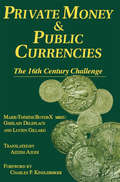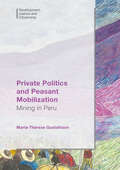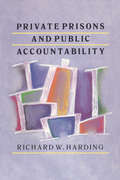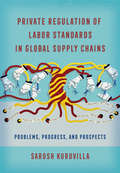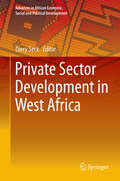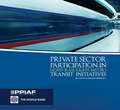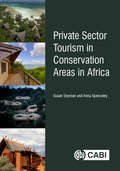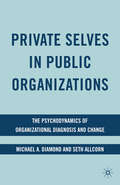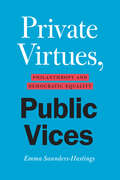- Table View
- List View
Private Money and Public Currencies: The Sixteenth Century Challenge
by M-.T.Boyer- Xambeau A. AzodiFirst Published in 1994. Routledge is an imprint of Taylor & Francis, an Informa company.
Private Placement of Public Equity in China
by Pengcheng SongBy retrieving entries from the financial-data vendor Wind and collecting relevant data from private placement statements, the author builds a proprietary database and studies five aspects of private placement in China. He examines which listed firms are more likely to choose private placement over SEO in refinancing; he looks into the controlling shareholder's decision on whether or not to purchase privately placed shares; he investigates how the offer discount is determined; he calculates announcement periods for abnormal returns on private placements. Where the abnormal return is significantly positive, he documents positive long-run abnormal return on private offerings and evidence supporting the under-reaction hypothesis. Finally, he concludes that the largest shareholders tunnel by means of excess discounts from which they benefit but which is harmful to other shareholders.
Private Policing of Economic Crime: Case Studies of Internal Investigations by Fraud Examiners (The Law of Financial Crime)
by Petter GottschalkThis book discusses private policing conducted by fraud examiners and financial crime specialists when there is suspicion of white-collar crime. The theory of convenience applies to the suspected crime, while the maturity model applies to the conducted investigation. Private policing of economic crime by fraud examiners in internal investigations is a topic of increasing concern as there is a growing business for law firms and auditing firms to conduct inquiries and reviews when there is suspicion of misconduct, wrongdoing, and crime by white-collar offenders. The key features of this book are the application of a structural model for convenience theory and the application of a maturity model for fraud examinations. The structural model assesses convenience themes for motive, opportunity, and willingness in each case study, while the maturity model assesses the level of private policing maturity in fraud examinations. For the first time, two emerging frameworks to study white-collar offenses and private policing maturity are introduced and applied to a number of cases from Denmark, Iceland, Moldova, the Netherlands, Norway, Sweden, and Switzerland. This book will be essential to those studying law, business, and criminology, as well as practicing fraud examiners.
Private Politics and Peasant Mobilization
by Maria-Therese GustafssonThis book explores how different corporate governance strategies affect community mobilization and the scope for influence when an area's population is faced with the arrival of the extraction industry. Drawing on ethnographic research into Peruvian mining localities, the author analyses a series of relationships which are characterized by confrontations, clientelism, demobilization and strategic collaboration. By presenting a detailed account of micro practices and showing how these processes are interpreted by different groups, Gustafsson offers a refined understanding of the multiple layers and informal workings of power between transnational corporations and local communities.
Private Power and Global Authority: Transnational Merchant Law in the Global Political Economy
by A. Claire CutlerTransnational merchant law, which is mistakenly regarded in purely technical and apolitical terms, is a central mediator of domestic and global political/legal orders. By engaging with literature in international law, international relations and international political economy, the author develops the conceptual and theoretical foundations for analyzing the political significance of international economic law. In doing so, she illustrates the private nature of the interests that this evolving legal order has served over time. The book makes a sustained and comprehensive analysis of transnational merchant law and offers a radical critique of global capitalism.
Private Power, Public Purpose: Adventures in Business, Politics, and the Arts
by Thomas d'AquinoA remarkable memoir by the man at the apex of Canadian power for over fifty years, Private Power, Public Purpose is the ultimate insider's history in the worlds of politics, business, and philanthropy.Private Power, Public Purpose is an ambitious and sweeping first-hand account of the past 50 years of Canadian economic history, told from the front lines…. A highly rewarding read.Stephen Poloz, former Governor of the Bank of Canada and author of The Next Age of UncertaintyIn this monumental memoir, Thomas d&’Aquino offers personal insights on four decades of bold leadership at the apex of power. A transforming force in redefining the role of business and the shaping of responsible capitalism, Canada&’s private sector leader in advancing the free trade agreement with the United States, valiant defender of national unity, and passionate environmentalist, he has been at the centre of every major policy debate that has influenced contemporary Canada.Referred to by his peers as &“Canada&’s leading business ambassador,&” Private Power, Public Purpose chronicles exploits on five continents and describes how he has championed Canada&’s place as an economic player on the world stage. His insights on leadership are timeless, honed from relationships with six Canadian prime ministers, over 1000 chief executives, and dozens of global leaders. Beyond business and public policy, Thomas d&’Aquino&’s fascinating adventures in the world of voluntarism, the arts, and philanthropy reveal a great deal about the soul of this remarkable Canadian.
Private Practice MBA: A Step-by-Step Guide to Put Your Practice on Autopilot
by Dr. Jeremy Pyle Robbie PoeA step-by-step road map for creating the business that you, your staff, and your patients deserve.Let&’s get real . . . Should you read this book? Here&’s the thing: Most physicians aren&’t looking for something new. Most of us are pretty set in our ways, and we&’re taught from day one to be fearful of running our own practices. But what if you didn&’t have to do it alone? What if you knew how to run a thriving practice that didn&’t run your life into the ground? What if there was a step-by-step system that you felt confident implementing yourself? That&’s exactly what you&’ll find within the pages of this book. And if that&’s the kind of thing you&’ve been looking for, then let&’s get started . . . together.
Private Prisons and Public Accountability
by Richard HardingPrivate prisons have become an integral part of the penal system in the United States, the United Kingdom, and Australia. There already are over 100 such prisons in these countries, and with the number of prisoners continuing to increase rapidly, the trend toward privatization seems irreversible. In this context, Richard Harding addresses the following issues: the contributions, positive or negative, that private prisons make to providing custody for offenders; whether or not private prisons stimulate improvement within the public prison system; and the difficulties with the regulation and accountability of private prisons.This book sets out to explore the contribution of private prisons to custodial practices, standards, and objectives. Many experts believe that, properly regulated and fully accountable, private prisons could lead to improvement within the public prison system, which has long been degenerate and demoralized. Harding sees the total prison system as a single entity, with two components: public and private. He relies upon extensive fieldwork and draws upon published literature as well as in-house documentation, discussions with public and private authorities, and a range of government documents.Key issues covered in Private Prisons and Public Accountability are: overcrowding, program delivery, prisoners' rights, quality of staff, and financial control. This volume will be a significant addition to the criminal justice literature, but it will also appeal to sociologists, policymakers, and scholars interested in the privatization of various institutions in our society.
Private Ratings, Public Regulations
by Andreas KruckCredit rating agencies play a powerful and contentious role in the governance of global financial markets. Introducing an original framework for delegating political authority to private actors, this book explains common trends in the regulatory use of private ratings for public purposes and analyzes regulatory changes after the Financial Crisis.
Private Regulation of Labor Standards in Global Supply Chains: Problems, Progress, and Prospects
by Sarosh KuruvillaPrivate Regulation of Labor Standards in Global Supply Chains examines the effectiveness of corporate social responsibility on improving labor standards in global supply chains.Sarosh Kuruvilla charts the development and effectiveness of corporate codes of conduct to ameliorate "sweatshop" conditions in global supply chains. This form of private voluntary regulation, spearheaded by Nike and Reebok, became necessary given the inability of third world countries to enforce their own laws and the absence of a global regulatory system for labor standards. Although private regulation programs have been adopted by other companies in many different industries, we know relatively little regarding the effectiveness of these programs because companies don't disclose information about their efforts and outcomes in regulating labor conditions in their supply chains.Private Regulation of Labor Standards in Global Supply Chains presents data from companies, multi-stakeholder institutions, and auditing firms in a comprehensive, investigative dive into the world of private voluntary regulation of labor conditions. The picture he paints is wholistic and raw, but it considers several ways in which this private voluntary system can be improved to improve the lives of workers in global supply chains.
Private Sector Development in West Africa
by Diery SeckThis book examines key determinants of private sector development in West Africa, putting special emphasis on government's cardinal role in fostering and supporting entrepreneurship. Favorable macroeconomic conditions are identified and it is shown that adequate policies that contribute to economic diversification and industrialization are likely to expand the investment base of the economy. The book also examines new business concepts and regional integration initiatives meant to enhance West Africa's private sector and analyzes the role of finance in promoting development of private firms and the extent to which corruption impedes economic growth. All chapters are highly relevant to West Africa's current policy challenges and therefore inform the region's ongoing policy formulation. The empirical evidence supporting the policy recommendations is based on both qualitative field observations and advanced quantitative estimation techniques.
Private Sector Entrepreneurship in Global Health: Innovation, Scale and Sustainability
by Will Mitchell Kathryn Mossman Anita M. McGahan Onil BhattacharyyaPoor access to care in low- and middle-income countries due to high costs, geographic barriers, and a shortage of trained medical staff has motivated many organizations to rethink their model of health service delivery. Many of these new models are being developed by private sector actors, including non-profits, such as non-governmental organizations, and for-profits, such as social enterprises. By partnering extensively with public sector organizations, these non-state actors have enormous potential to scale innovation in global health. Understanding how these leading organizations operate and target hard-to-reach groups may yield key insights to sustainably improve health care for all. Private Sector Entrepreneurship in Global Health includes writings by management, medicine, and social science experts who have studied trends in private sector health care innovations over the last ten years. It provides a wide range of examples from many regions and health areas and outlines tools to assess the performance of innovative private sector health programs in low- and middle-income countries. The studies reported in this volume explore new marketing and finance models, digital health innovations, and unique organizational processes emerging from the private sector to serve those most in need. Drawing on the analysis of over one thousand organizations engaged in health market innovations, this volume is a valuable resource for researchers and students in management, global health, medicine, development studies, health economics, and anthropology, as well as program managers, social impact investors, funders, and policymakers interested in understanding approaches emerging from the private sector in health care.
Private Sector Environmental Information and the Law (Routledge Research in International Environmental Law)
by Juliana Zuluaga MadridCurrent advancements in civil rights and environmental activism emphasize the crucial importance of making environmental information widely available to the public, regardless of whether it is in the hands of the government or of corporations, especially when the information is needed to understand and prevent risks for human health and the environment. In the wake of a resurgence of environmental and civil rights activism, conflicts flare between the right of the people to know and the right of private actors to keep certain information hidden, mostly for commercial reasons. This book offers a detailed comparative analysis of how environmental information is being accessed in different countries and jurisdictions, and how these issues are currently being handled by judges and governments. Focusing on the right of access to environmental information held and produced by private actors and the legal issues that emerge when other values and rights are compromised, this book offers an alternative framework to improve on current legal systems, suggesting a more nuanced and balanced approach that takes both set of interests duly into consideration. Providing an integrated approach to public environmental law and private commercial law, the book integrates the arguments from both sides to establish a common ground, defining shared principles and models that provide a solid basis for a robust new system. Reviewing access to private sector information at a truly international level, this book will be relevant to students, academics and practitioners working in these areas.
Private Sector Involvement in the Euro: The Power of Ideas (Routledge Advances In European Politics Ser.)
by Stefan Collignon Daniela SchwarzerThis book looks at the role of the Association for Monetary Union in Europe's role in the construction of the Euro. It argues that the AMUE played a prominent role in the adoption of a number of proposals related to the single currency and had a guiding influence on the transition from a market-let to an institution-centred approach to monetary uni
Private Sector Participation in Light Rail-Light Metro Transit Initiatives
by Cledan Mandri-PerrottThis book aims to help governments and public authorities to establish effective light rail-light metro transit (LRMT) systems, and focuses on use of Public Private Participation (PPP) arrangements. Rather than identify a single approach, we present options and discuss practical issues related to preparing and implementing new LRMT PPP schemes. The approach is focused on providing information that can be used to make informed decisions, adapted to local policy and objectives. The material presented is intended as a practical guide to developing LRMT PPPs in both developed and developing countries. This work endeavors to provide answers to readers' questions regarding how to successfully incorporate private sector participation in LRMT with a lesser emphasis on why LRMT and the private sector may be beneficial. The primary focus of this text is guiding the reader from design through to project implementation. It starts from the premise that underlying transport policy decisions will have already been made and that LRMT has already been identified as the appropriate transport solution. We have included some limited discussion of policy and technical issues where these directly impact the LRMT PPP approach. The approach is presented in nine sections, and in preparing it the author drew on current international LRMT PPP experience, through a series of interviews and case studies. The sections covered are: 1. Urban Transport and Light Rail/Light Metro Transit (LRMT) 2. Selected Technical Aspects 3. Incorporating Private Sector Participation in LRMT Initiatives 4. Understanding and Allocating Risk 5. Specifications, Oversight and Performance Management 6. Funding and finance 7. Developing a PPP Agreement 8. Procurement 9. Conclusions and Recommendations
Private Sector Tourism in Conservation Areas in Africa
by Anna Spenceley Susan Snyman"Using a rich set of detailed case studies, this volume furnishes the first comprehensive analysis of the role of the private sector in conservation areas. For researchers of tourism, development studies and biodiversity conservation this book is a new and important benchmark in African scholarship." -Christian M. Rogerson, Research Professor, School of Tourism & Hospitality, University of Johannesburg. "This is an impressive book that will make an important contribution to the literature on private-sector involvement in the delivery of tourism services in parks and protected areas in Africa." - Dr. Paul F. J. Eagles, Distinguished Professor Emeritus, Department of Recreation and Leisure Studies, University of Waterloo. Tourism in Africa's protected and conserved areas involves partnerships and interactions between numerous stakeholders such as governments, communities, NGOs, the private sector and academics. Through the use of 32 comprehensive case studies from 11 African countries, this book presents guidelines to ensure optimal benefits for stakeholders as well as promoting the sustainability of tourism in Africa. It includes descriptions of the various models for the private sector to engage in tourism in conservation areas in Africa, such as pure private sector ownership, joint ventures, tripartite agreements and government leases. End-to-end coverage of the processes used to develop these partnerships is provided, as well as best practices for the private sector engaging in tourism. The book provides guidance on identifying the most suitable private sector tourism options based on guidelines of conditions and desired outcomes, to promote the long-term sustainability of African tourism in protected areas. Key features include: - The first book to provide a detailed analysis of private sector involvement and partnerships in tourism in Africa. - Includes best practice examples to develop tourism partnerships with the private sector. - Highlights important tools to enhance the sustainability of tourism in Africa, involving numerous stakeholders. This book is recommended for academics, students and practitioners working in sustainable tourism, including community, private sector and government stakeholders.
Private Sector Tourism in Conservation Areas in Africa
by Anna Spenceley Susan Snyman"Using a rich set of detailed case studies, this volume furnishes the first comprehensive analysis of the role of the private sector in conservation areas. For researchers of tourism, development studies and biodiversity conservation this book is a new and important benchmark in African scholarship." -Christian M. Rogerson, Research Professor, School of Tourism & Hospitality, University of Johannesburg. "This is an impressive book that will make an important contribution to the literature on private-sector involvement in the delivery of tourism services in parks and protected areas in Africa." - Dr. Paul F. J. Eagles, Distinguished Professor Emeritus, Department of Recreation and Leisure Studies, University of Waterloo. Tourism in Africa's protected and conserved areas involves partnerships and interactions between numerous stakeholders such as governments, communities, NGOs, the private sector and academics. Through the use of 32 comprehensive case studies from 11 African countries, this book presents guidelines to ensure optimal benefits for stakeholders as well as promoting the sustainability of tourism in Africa. It includes descriptions of the various models for the private sector to engage in tourism in conservation areas in Africa, such as pure private sector ownership, joint ventures, tripartite agreements and government leases. End-to-end coverage of the processes used to develop these partnerships is provided, as well as best practices for the private sector engaging in tourism. The book provides guidance on identifying the most suitable private sector tourism options based on guidelines of conditions and desired outcomes, to promote the long-term sustainability of African tourism in protected areas. Key features include: - The first book to provide a detailed analysis of private sector involvement and partnerships in tourism in Africa. - Includes best practice examples to develop tourism partnerships with the private sector. - Highlights important tools to enhance the sustainability of tourism in Africa, involving numerous stakeholders. This book is recommended for academics, students and practitioners working in sustainable tourism, including community, private sector and government stakeholders.
Private Security Law: Case Studies
by David Maxwell<P>A lot has changed since we began collaborating.<P> At the time that we launched this project, most intellectual property courses were taught along particular mode of protection lines: patent law, copyright law, trademark law, and trade secret law.
Private Security and the Investigative Process, Fourth Edition
by Charles P. NemethPrivate Security and the Investigative Process, Fourth Edition is fully updated and continues to provide complete coverage of the investigative process for private investigations by both individuals and in corporate security environments. This edition covers emerging technology, revised legal and practical considerations for conducting interviews, and new information on case evaluation. Written by a recognized expert in security, criminal justice, ethics, and the law—with over three decades of experience—the updated edition of this popular text covers concepts and techniques that can be applied to a variety of investigations including fraud, insurance, private, and criminal. It details the collection and preservation of evidence, the handling of witnesses, surveillance techniques, background investigations, and report writing. The book reflects best practices and includes tips for ensuring accurate and reliable private sector security investigations. This new edition includes: A new section on career opportunities in paths in the investigative field A rundown of the leading security Industry associations and professional standards being published Added discussion of observational interviews include current protocols analyzing data Details of the current legal implications for security surveillance and practices Advances in technology to thwart crime and fraud in retail and other business settings An entirely new section on e-records from criminal and civil judgments Authoritative, yet accessible, this book is one of the only textbooks dedicated to the subject. It also serves as an important reference for private investigators and security professionals. Complete with numerous forms, checklists, and web exercises, it provides the tools and understanding required to conduct investigations that are professional, ethical, and effective.
Private Security: An Introduction to Principles and Practice
by Charles P. NemethPrivate Security: An Introduction to Principles and Practice, Second Edition explains foundational security principles—defining terms and outlining the increasing scope of security in daily life—while reflecting current practices of private security as an industry and profession. The book looks at the development and history of the industry, outlines fundamental security principles, and the growing dynamic and overlap that exists between the private sector security and public safety and law enforcement—especially since the events of 9/11. Chapters focus on current practice, reflecting the technology-driven, fast-paced, global security environment. Such topics covered include security law and legal issues, risk management, physical security, human resources and personnel considerations, investigations, institutional and industry-specific security, crisis and emergency planning, computer, and information security. A running theme of this edition is highlighting—where appropriate—how security awareness, features, and applications have permeated all aspects of our modern lives. Key Features: Provides current best practices detailing the skills that professionals, in the diverse and expanding range of career options, need to succeed in the field Outlines the unique role of private sector security companies as compared to federal and state law enforcement responsibilities Includes key terms, learning objectives, end of chapter questions, Web exercises, and numerous references—throughout the book—to enhance student learning Critical infrastructure protection and terrorism concepts, increasingly of interest and relevant to the private sector, are referenced throughout the book. Threat assessment and information sharing partnerships between private security entities public sector authorities—at the state and federal levels—are highlighted. Private Security, Second Edition takes a fresh, practical approach to the private security industry’s role and impact in a dynamic, ever-changing threat landscape.
Private Selves in Public Organizations
by Michael A. Diamond Seth AllcornThis book explores organizations as not simply rational, technological structures and networks for organizing people around tasks and services; it defines organizations as relational, experiential, and perceptual systems.
Private Spaceflight: A Case Study of Iconoclasts Working Together
by Gregory BernsPutting ordinary citizens into space strikes most people as crazy. Space is a frontier that the vast majority of humanity currently has no access to, no interest in, and wonders why anyone should spend exorbitant sums of money to travel to. To even consider such a venture flies in the face of conventional wisdom, which is why the privatization of spaceflight represents a unique case study in iconoclasm. The key players are all people who exemplify the three characteristics of iconoclastic thinkers: they see differently, deal with fear, and have high levels of social intelligence.
Private Truths, Public Lies: The Social Consequences Of Preference Falsification
by Timur KuranDrawing on diverse intellectual traditions, including those rooted in economics, psychology, sociology, and political science, Kuran provides a unified theory of how preference falsification shapes collective decisions, orients structural change, sustains social stability, distorts human knowledge, and conceals political possibilities.
Private Virtues, Public Vices: Philanthropy and Democratic Equality
by Emma Saunders-HastingsA thought-provoking challenge to our ideas about philanthropy, marking it as a deeply political activity that allows the wealthy to dictate more than we think. Philanthropy plays a huge role in supporting the provision of many public goods in contemporary societies. As a result, decisions that affect public outcomes and people’s diverse interests are often dependent on the preferences and judgments of the rich. Political theorist Emma Saunders-Hastings argues that philanthropy is a deeply political activity. She asks readers to look at how the power wielded by philanthropy impacts democracy and deepens political inequality by enabling the wealthy to exercise outsize influence in public life and by putting in place paternalistic relationships between donors and their intended beneficiaries. If philanthropy is to be made compatible with a democratic society of equals, it must be judged not simply on the benefits it brings but on its wider political consequences. Timely and thought-provoking, Private Virtues, Public Vices will challenge readers’ thoughts on what philanthropy is and how it truly affects us.
Private Voluntary Health Insurance
by Greg Brunner Pablo Gottret Birgit Hansl Vijayasekar Kalavakonda Nicole Tapay Somil NagpalHealth insurance can offer protection against catastrophic medical expenses and improve access to health care. There are, however, imperfections in the insurance market that require intervention such as asymmetry of information between the policy holder and the insurance company, moral hazard that can occur on the side of the insured or the provider of health services, risk selection that may lead to cream skim a particular market, and others. To encourage the effective development of Voluntary Private Health Insurance, it will be necessary for policymakers to establish and enforce regulatory standards that will attempt to correct inefficiencies from market failures and that will achieve desired social objectives. This book is intended to help countries that are contemplating how to design and implement a legal framework for a private health insurance market. First, it provides an overview of private health insurance, the rationale for insurance regulation, and the institutions involved in administering insurance laws. It then reviews the key standards and protections that are often used in regulating private health insurance. As part of the discussion on regulatory standards, options for supervisors in certain areas where policy and regulation approaches vary will be noted. To illustrate international experience, examples of the regulation of private health insurance from several low, middle, and high-income countries will be drawn upon throughout the book.
